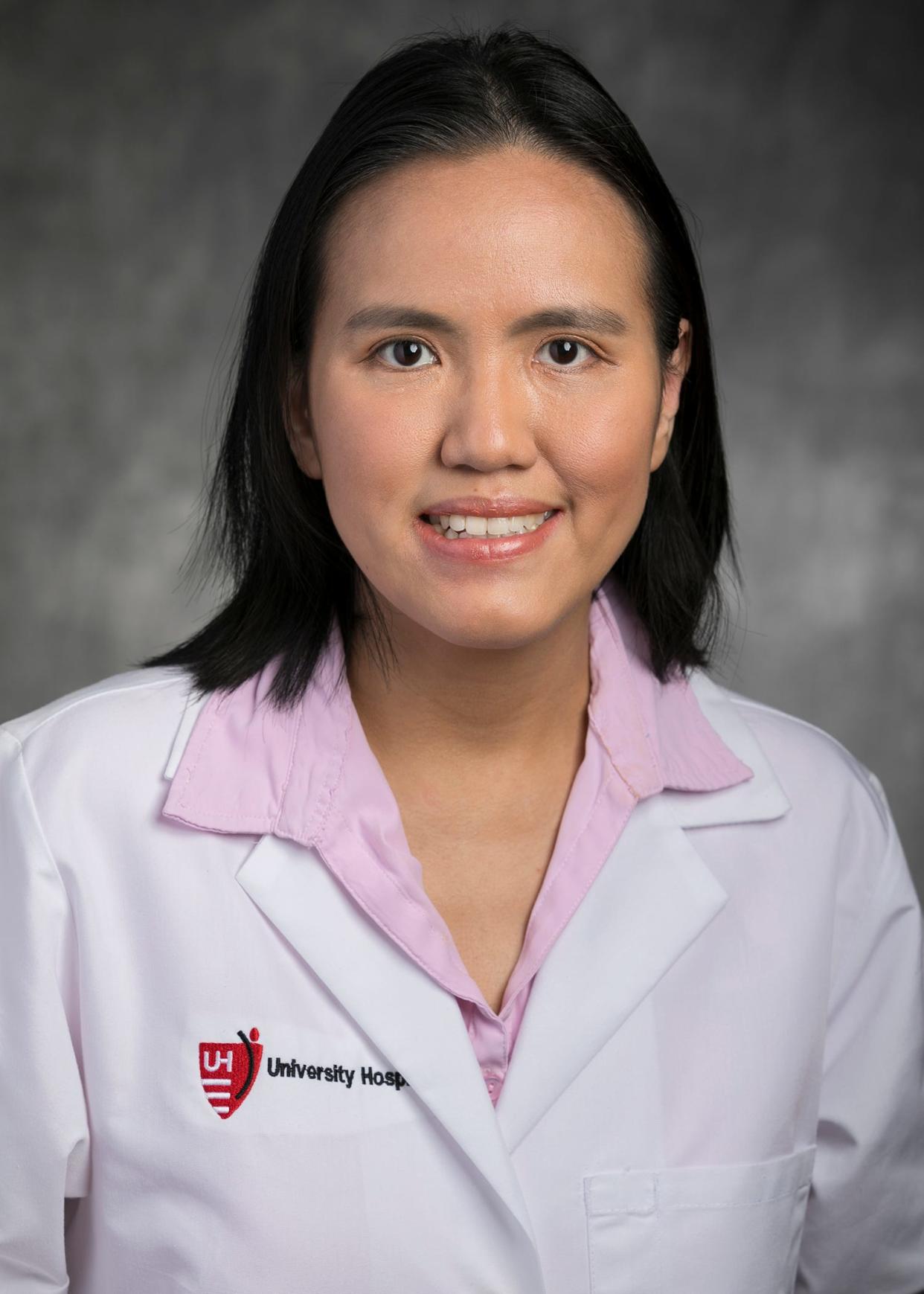In need of a good night's sleep? Here's tips and help from a doctor| Betty Lin-Fisher

Today’s column may make you sleepy — and that could be a good thing!
For this month’s Healthy Actions column, our expert is Dr. Eileen Wong, University Hospitals East Region Sleep Lab Medical Director. She is based at sleep labs in Streetsboro and in Geauga County.
The Healthy Actions column is a monthly look at a different medical topic of interest with a local medical expert. To read previous columns, go to www.tinyurl.com/BettyHealthyActions
More: Betty Lin-Fisher: Links to Healthy Actions columns
Wong and her colleagues see patients who are having problems with sleep, whether it’s problems falling asleep, staying asleep, snoring or if the person stops breathing during sleep. They also see patients who move their legs excessively at night or patients who are excessively sleepy during the daytime.
The following is an edited version of an interview with Wong. There is also an Now You Know Akron podcast of our interview available.

We always hear we need eight hours of sleep. Is that true?
It really depends on your age. If you are 18 and above, seven to nine hours is actually good and when you reach age 65, seven to eight hours is recommended.
However, if you sleep six hours, it's still acceptable. If it's less than six hours, that's probably too little.
There is also a segment of the population whom we call short sleepers. They usually sleep less than six hours and then they feel good. They don't have issues like fatigue in the daytime, problems with memory, mood, concentration or drowsy driving or daytime sleepiness.
For the most part, people usually need seven to nine hours and research has shown that seven is actually better.
Healthy Actions: Are you anxious about crowds or fearful of public places? Learn about anxiety, agoraphobia
What is REM sleep and what are the benefits?
There are two stages of sleep: non-REM or non rapid eye movement sleep and sleep when you are dreaming, which is called REM sleep, or rapid eye movement.
Non-REM is usually good for physical health. REM sleep is good for your mental health. During REM sleep, that's the time where our brain is trying to recall what we learned in the morning and in the daytime and then to relearn how to do it.
There are three stages of non-REM sleep before REM. The deep sleep that we’re talking about or restorative sleep is not really in REM, but Stage 3 of non-REM sleep.
In kids, the deep sleep is very important because that’s the time the growth hormone is produced so they can grow taller and all those things. Our immunity is also enhanced during deep sleep.
So to clarify, there is non-REM sleep first, then REM?
Yes, so with a normal patient, you start with non-REM stages 1, 2 and 3 and then you go into REM. And then sometimes from REM, you go to Stage 2 and then go back to 3 and then 1. It really depends on the person. So it's like an alternating cycle. Each cycle can last anywhere from 90 to 100 minutes. Each cycle is composed of non-REM and REM.
Healthy Actions: Let's talk about kids and sports with sports psychologist
Why is good sleep important?
A good, restful sleep has a lot of benefits for us. It’s the time where our memories are consolidated and stored. It’s the time where muscles repair and recover.
If you don’t sleep well, the following day, you feel like your judgment and concentration are impaired. Your reaction time is slowed. There's a lot of short-term and long-term issues when you’re not getting adequate sleep.
How does watching TV or looking at your phone or electronics affect sleep?
The TV, laptop, cell phone and iPad actually emit blue light. When your brain sees this blue light, it thinks we need to be awake.
We usually tell patients that part of a good sleep habit is to turn off any gadgets that emit blue light anywhere from one to two hours before you go to sleep. We tell patients don’t go to sleep unless you’re sleepy. If you are in bed and you’re not falling asleep in 15 minutes, get out of bed. Go to a chair inside your bedroom or another room and do something boring.
So don’t get up and grab your phone?
When you get up and grab your phone, you’re exposing yourself to the blue light again and it’s going to be hard to fall back asleep or fall asleep. Do something boring and make sure it's under dim light like yellow light. If you turn on your white light in the room or you start exposing yourself to gadgets that emit blue light, then you start telling your brain that you need to be more awake.
Some of my patients flip through magazines or color until they feel sleepy.
Should people nap?
You should avoid napping during the daytime. When you're awake during the daytime, you're building up sleep pressure and when the sleep pressure peaks, that's the time you feel sleepy. If you sleep in the daytime, then your sleep pressure goes down and it will be harder for you to fall asleep at night.
What about caffeine?
Caffeine usually blocks the adenosine in the body and this adenosine is the one that contributes to the sleep pressure.
Different patients have different rates of metabolism. As an example, when I was younger when I drank caffeine at 6 p.m., I could still fall asleep at 9 p.m. But for some reason as I got older, I have to cut my caffeine by noon otherwise I can’t fall asleep at night.
As we get older, it seems the metabolism of caffeine is slower. We usually advise patients to cut it off past noon.
What about water intake?
I tell patients to limit fluid intake to 8 ounces at dinnertime and after that, do not drink any more water. If you have pills to take at bedtime, make sure to drink it with only sips of water or just enough to swallow the pills. That way, when you go to sleep, you don’t wake up a lot to go to the bathroom.
What are some reasons patients might come to see a sleep specialist?
Patients who have some type of abnormal behavior in their sleep would come to see me. Or sometimes it’s not an abnormal behavior, but breathing problems. The most common patient we see in the sleep clinic is someone with breathing problems during sleep. That can be because the husband is snoring so loud and sounds like a dragon and the wife cannot sleep, so the wife’s sleep is affected.
Some patients stop breathing while sleeping or wake up gasping for air or have a choking sensation during sleep. We also have patients who are drowsy driving in the morning, or people who excessively sleep during the daytime.
Some other patients have abnormal sensations in the legs before sleeping. That's usually related to Restless Leg Syndrome or some patients act out their dreams during sleep. Some may have sleepwalking behaviors or some people call them sleep terrors. Those are also things to be seen by a sleep specialist.
Other reasons patients might see a sleep specialist would be problems falling asleep or staying asleep, or fatigue, increased irritability, general malaise or even cognitive impairment, usually in adults.
Adults and kids also show different symptoms. Kids who don’t have a restful sleep may show it it in poor school performance, impaired attention or sometimes aggression or hyperactivity.
Still other issues to see a sleep specialist might be narcolepsy, which is not common, but patients can fall asleep while standing or during an activity, like eating. As soon as they fall asleep, they go into the dreaming stage.
Some patients also may have a sleep-eating behavior where they wake up and look for something to eat and don’t remember the following day.
Some patients also have circadian rhythm problems, which are body clock issues being awake at night and sleepy during the day.
Do patients need a referral?
It depends on the insurance. Some need a referral and some allow a self-referral.
What happens in a sleep study and when would a patient have one?
There are two types of sleep studies: a home sleep apnea test and an in-lab sleep study. Sometimes it depends on what insurance will cover. Some insurances only cover an in-home study before they cover an in-lab study. Most commonly, we do sleep studies for sleep apnea and narcolepsy.
An in-lab sleep study will gather a lot more data since there are air-flow sensors, belts watching breathing and monitors on the finger to check for heart rate and oxygen saturation. We also watch heart rhythms and check for leg movement. There are also wires on the scalp to check for sleep staging.
What treatments are there for sleep apnea?
If a patient comes back positive in an in-home sleep study for sleep apnea, there are two options: We either start a patient right away with a CPAP machine (which stands for continuous positive airway pressure) or we can have them come in for an in-lab study.
If a CPAP machine is not tolerated, we may try a BIPAP (bi-level positive airway pressure) machine or add oxygen. Some patients may need an ASV (adaptive servo-ventilation) machine.
We also sometimes use an oral appliance, worn on the upper and lower jaw during sleep, though it depends on insurance.
Another option is something we call Inspire, which is fairly new. It is basically a battery implanted under your skin that comes with a remote control. At night, the device moves the tongue forward every time the patient is breathing while sleeping. It kind of looks like a pacemaker.
Are there any cases where a patient might be prescribed medications?
For sleep apnea, there’s still research being done to see if there are medications to help. Right now, there are no medications that are highly effective for sleep apnea.
What about over-the-counter sleep medications or melatonin?
Our body produces melatonin, which calms our body and brain to prepare the body for sleep. Some patients find melatonin supplements effective and some don’t. It is not a sleeping pill, but helps the body to prepare to fall asleep.
Sometimes we use melatonin to move the body clock forward if you stay up past midnight, but you have to wake up at 6 a.m. for school, but you’re sleepy during the daytime.
Bottom line, if it is for body-clock issues, melatonin is a good medication that we use.
We usually don’t want patients taking over-the-counter sleeping pills that have things like Benedryl or diphenhydramine because it can cause you to have restless leg syndrome. We also want patients to sleep naturally and not rely on medications to fall asleep.
Beacon Journal staff reporter Betty Lin-Fisher can be reached at 330-996-3724 or blinfisher@thebeaconjournal.com. Follow her @blinfisherABJ on Twitter or www.facebook.com/BettyLinFisherABJ To see her most recent stories and columns, go to www.tinyurl.com/bettylinfisher
This article originally appeared on Akron Beacon Journal: Betty Lin-Fisher: Tips for a good night's sleep and when to seek help

